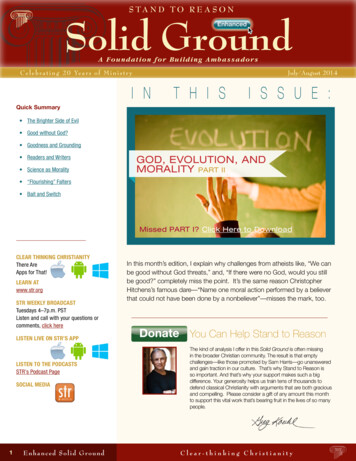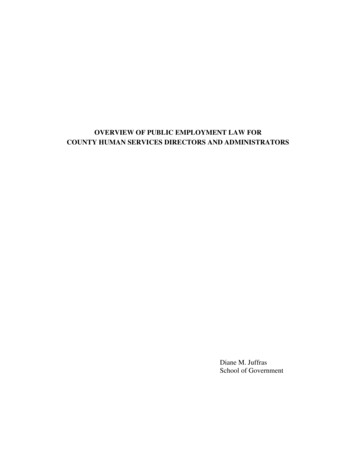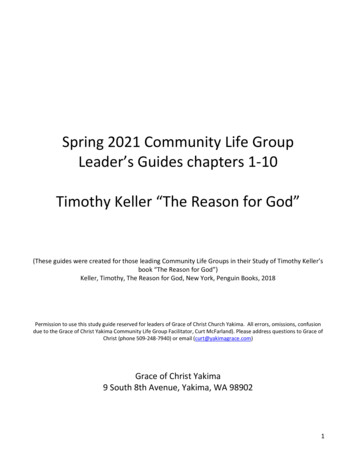
Transcription
s ta n d t o r eas o ntop 1Solid GroundA F o und atio n for Bui ldi n g AmbassadorsC e l ebr a t i n g 20 Ye a rs o f M in is tryJuly/August 2014i nt h i si s s u e :Quick Summary The Brighter Side of Evil Good without God? Goodness and Grounding Readers and Writers Science as MoralityGod, Evolution, andMorality Part II “Flourishing” Falters Bait and SwitchMissed Part I? Click Here to DownloadClear Thinking ChristianityThere AreApps for That!Learn Atwww.str.orgStr Weekly BroadcastTuesdays 4–7p.m. PSTListen and call with your questions orcomments, click hereListen Live On STR’s APPListen To The PodcastsSTR’s Podcast Pagesocial media1Enha n c e d S ol i d Gro un dIn this month’s edition, I explain why challenges from atheists like, “We canbe good without God threats,” and, “If there were no God, would you stillbe good?” completely miss the point. It’s the same reason ChristopherHitchens’s famous dare—“Name one moral action performed by a believerthat could not have been done by a nonbeliever”—misses the mark, too.You Can Help Stand to ReasonThe kind of analysis I offer in this Solid Ground is often missingin the broader Christian community. The result is that emptychallenges—like those promoted by Sam Harris—go unansweredand gain traction in our culture. That’s why Stand to Reason isso important. And that’s why your support makes such a bigdifference. Your generosity helps us train tens of thousands todefend classical Christianity with arguments that are both graciousand compelling. Please consider a gift of any amount this monthto support this vital work that’s bearing fruit in the lives of so manypeople.Clear-thinking Christianity
top 2Clear-thinking ChristianityJuly 1, 2014Dear Friend,In the last Solid Ground, I began my defense of the moral argument for God’s existence bydemonstrating that no appeal to either Darwin or Rousseau—to the evolved individual or to theconstructed social contract—was capable of doing it damage.Neither of those alternatives could, even in principle, account for the existence of objective moralobligations. Both collapse into relativism.In this month’s edition, I explain why challenges from atheists like, “We can be good without Godthreats,” and, “If there were no God, would you still be good?” completely miss the point. It’s thesame reason Christopher Hitchens’s famous dare—“Name one moral action performed by a believerthat could not have been done by a nonbeliever”—misses the mark, too.Finally, I critique new atheist Sam Harris’s clever—but compromised—attempt to escape therelativism trap in his book, The Moral Landscape.The material in this Solid Ground is not as easy as other installments. As always, though, I workedhard to “throw the ball so you can catch it”—stepping you through the information so you grasp thekey issues because this theme is a common objection from atheists. You’ll encounter it sooner orlater if you haven’t already.Give this analysis some attention and you will begin to understand a central component of thisdebate that virtually every atheist misses. It’s called the grounding problem. I think you’ll see thatnothing the atheist can throw at us will deliver him from the daunting problem that the existence ofobjective morality poses for his materialistic worldview.The kind of analysis I offer in this Solid Ground is often missing in the broader Christian community.The result is that empty challenges—like those promoted by Sam Harris—go unanswered and gaintraction in our culture.That’s why Stand to Reason is so important. And that’s why your support makes such a bigdifference. Your generosity helps us train tens of thousands to defend classical Christianity witharguments that are both gracious and compelling.Please consider a gift of any amount this month to support this vital work that’s bearing fruit in thelives of so many people. And thank you so much for your partnership.With confidence in Christ,Gregory KouklS T R’ S L I VE WE E KLY BROADCASTGreg takes your questions and comments on ethics, values, and religionTuesdays 4-7 p.m. P.T. Tune in online or on your STR app.2Enha n c e d S ol i d Gro un dA Foundation for Building Ambassadors
top 3God, Evolution, and MoralityPart IIBy Greg KouklIn 1982, I lived in Thailand for seven monthssupervising a feeding program in a Cambodianrefugee camp named Sakaeo. My charge: 18,250Khmer refugees who had escaped the holocaustperpetrated on Kampuchea by the Khmer Rougeafter the fall of Phnom Penh in 1975.The first-person accounts told to me of theslaughter that took place were mind-numbing. Evenchildren relayed stories of unthinkable brutality. By1979, nearly two million Cambodians had perished,almost half of the population. It was the greatest actof genocide ever inflicted by a people on its ownpopulation.It’s virtually impossible for any thoughtfulhuman being to countenance such barbarism—such innocent suffering, such inhumanity toman—without recoiling from the wickedness, thedepravity, the unmitigated evil that took place there.Surprisingly, though, atrocities like the Cambodiancarnage provide an unusual opportunity for thetheist and a striking liability for the atheist.The Brighter Side of EvilThe problem of evil is a daunting one forChristians, to be sure, yet ironically it places uson very solid footing to make the case for theism.The very same problem, though, puts atheism onthe ropes.To make this point during debates, I asktwo questions of my audience after I describe, ingruesome detail, the events of the Khmer crisis.First, what is their assessment of the behaviorsI just recounted? It’s a rhetorical question. To aperson, they judge the savagery profoundly evil.Second—and this is the important question—what are they describing when they call theseacts evil? Do they mean to be describing theactions themselves—the cruelty, the torment, theinjustice—or merely their own feelings or beliefsabout the actions?If the actions themselves are evil—if thewrongness is somehow in the behaviors regardless3Enha n c e d S ol i d Gro un dof what people think or feel (remember, the KhmerRouge had no moral qualms about what they did)—then the evil is objective. If the wrongness is onlyin the mind of the subject—the person or groupmaking the assessment—then the evil is merelysubjective and relativistic. In that case, the atrocitieswere only wrong for those who object, but wouldbe right for those who approve. The behaviorsthemselves would be morally neutral; Pol Pot wouldbe off the hook.Here’s the take-away: The problem of evil is onlya problem if morality is objective, not subjective.Relativistic morality is not sufficient grounds for thecomplaint about human suffering. Only objectivemorality will do. As it turns out, though, objectivemorality supports theism and undermines atheism.The theist must rise to the challenge of evil, to besure. But for her, the problem turns out to be anally. It fits her worldview like a glove. First, genuinewickedness depends on the existence of good inthe same way shadows depend on the existence oflight. One cannot have the first without the second.The theist accounts for that good by grounding itin the character of God. Second, the biblical viewof reality doesn’t merely explain atrocities like theCambodian massacre; it actually predicts them. It isprecisely what you’d expect if the biblical take istrue.The very same problem of evil, though,undermines atheism. The atheist must also take histurn offering his own explanation for evil, but hefaces a complication the theist does not encounter.How can anything be ultimately evil or good ina materialistic universe bereft of a transcendentstandard that make sense of the terms in the firstplace?When an atheist bemoans real evil—not therelativistic “evil” that evolution fooled us intobelieving or the actions violating a social contractthat serves our cultural purposes for the moment—he must explain how objective evil could exist inClear-thinking Christianity
top 4the first place to make room for his protest. Hemust account for the objective, transcendent moralstandard that has to be in position before moraljudgments of any kind can be made. His complaintwould be unintelligible without it.“No, the atheist has not gotten rid ofthe problem of evil by rejecting god.He has compounded the problem.”So, the atheist who challenges Christianity byasking how God can exist in a world with evil facesa bigger challenge than the theist. The atheist mustaccount for the problem of evil and the problemof good. The difficulty is, there is nothing in hisworldview that allows him to ground—to makesense of—vice or virtue in the objective sense.There is nothing in atheism proper that allows himto say anything meaningful about morality otherthan that our current moral convictions reflecteither our evolutionary adaptations or the fashionof the moment—which is to say nothing meaningfulabout morality.No, the atheist has not gotten rid of theproblem of evil by rejecting God. Hehas compounded the problem.At this point, there are onlytwo ways out for the atheist whois determined to cling to hisconviction. First, he can try todeny objective evil, dismissing itas illusion or useful fiction.Thiswould be a difficult pill to swallow,though, since his certaintythat evil was real (andnot a fabrication)launched his protestto begin with.Simply put, theatheist knows toomuch to go downthis road withease.RETHINKCONFERENCESTUDENT APOLOGETICSSEPTEMBER 26-27/2013O R A N G E C O U N T Y, C A4Enha n c e d S ol i d Gro un dSecond, he can cast about for an alternateexplanation for our universal experience of morality.The current main contender is Darwinian evolution.In the last issue of Solid Ground, I showed whythat route is a dead end. I argued that since themoral argument for God is based on the existenceof objective morality, only a successful naturalisticaccounting of the same—objective morality—wouldbe sufficient to undermine it. However, evolution isnot capable—even in principle—of delivering to usanything but relativistic morality.If Darwinism is only capable of explaining ourfeelings of morality—if the definition of good andbad is simply subjective and “up to us” in some sense(biologically or culturally)—then objective evilis reduced to a fiction after all and the complaintagainst God based on the existence of evil vanishesinto the relativistic mist with it.If, on the other hand, our indignation against evil iswell-founded, then one’s objection against God is atleast intelligible. Atheism then becomes the casualty,however. One cannot have it both ways.Good without God?Some atheists are not convinced, however. It’sclear to them they can be good without any belief inGod at all. Just ask them. “I’m as good as any otherreligious person, pretty much,” Michael Shermerhas pointed out,“and I don’t believe in God.” Thedefense rests.In the same vein, New Atheist ChristopherHitchens consistently fired off this famous salvoduring debates: “Name one moral action performedby a believer that could not have been done by anonbeliever.”Of course, this is not really the issue, is it? Carefultheists do not claim that belief in God is necessaryto do good, but that God is necessary for any act tobe good in the first place, that without Him moralityhas no ultimate objective foundation at all. Thequestion is not whether believers and non-believerscan perform the same behaviors—of course theycan—but whether any behavior can be objectivelygood in a materialistic world bereft of God.Who’s waiting for your students?When they leave the relative safety of your home, youthministry or church, who is waiting for them at school,the university, in the culture, or at their workplace?What challenges to Christianity will they encounter?And are they ready?A Foundation for Building Ambassadors
top 5He cannot worship the one fromwhom all goodness comes, andtherefore is worthy of our deepestdevotion and unerring fidelity.For a simple rejoinder to Hitchens’s challenge,point out that an atheist can mimic many thingsChristians count as good—he can feed the poor,love his neighbor, even sacrifice his life for others—but he can never do the summum bonum, thehighest good. He can never love God with his wholeheart, mind, soul, and strength. He cannot worshipthe One from whom all goodness comes, and whotherefore is worthy of our deepestdevotion and unerring fidelity.Of course, atheists wouldlikely dismiss the pointwith a sniff and a sneer,but they mustn’t missthe deeper implication.At bare minimum, theresponse demonstratesthat regardless of who isright on the God question,the entire moral projectis altered significantlywhen He is added to theequation. Simply put, theatheist and the theist do notshare the same morality.The difficulty goes deeper, though,and Hitchens and those like him havemissed the larger concern entirely. It’swhat philosophers call “the groundingproblem.”Goodness and GroundingLong before scientists hammeredout the details of gravity, ordinaryfolk could still predict howobjects moved under its5Enha n c e d S ol i d Gro un dinfluence. They knew that something caused (forexample) fruit to fall, and they could calculate howit worked, to some degree. But they didn’t knowwhy things behaved that way in the world.The “why it works” issue is called the “grounding”question. What is it that accounts for things beingthe particular—and sometimes peculiar—ways theyare? It applies in science. It also applies in morality.Moral facts are odd kinds of facts. They are notmerely descriptions—how things happen to be.They entail prescriptions, imperatives—how thingsought to be. They have incumbency, a certainobligation to them. What explains these unusualfeatures? What is their foundation?What “ground” do they rest upon?What—or who—actuallyobliges us and why shouldwe obey?It’s true that any sane,reasonable person canknow the differencebetween right and wrong.But why there is a rightand wrong to begin with isa different kind of question. Whydo objective moral obligations exist?Why do they seem to apply uniquely to humans?And why do we go astray so often and soconsistently?If one’s worldview is going to becomprehensive, it’s got to accountfor the things that really matter in theworld. Objective morality is one of them.Atheists may know the right thing to do—and even do it consistently. That alone,though, does not bring them any closer toanswering the grounding question.An illustration might be helpfulat this point.Clear-thinking Christianity
top 6reTHINK Student Apologetics Conference DVD – 39.95 *NEW*Various Speakers, DVD Video Set (6 discs): 360 minutes (DVD043)The intellectual and moral challenges facing our young people are immense. It’s time for the church to step upthe training and discipleship of our students.At Stand to Reason, we’re doing our best to help parents and leaders with this task by hosting the reTHINKStudent Apologetics Conference. Specifically tailored for students, this conference features a lineup of speakerswho not only know their stuff, but can also make the content accessible to young minds. These video sessionswill be an invaluable tool in effectively equipping students to stand for the truth of the Gospel. Presentationsinclude: John Stonestreet: It Matters What You Believe (Maybe More than You Think) Brett Kunkle: If God Is Good, Why Is There Evil and Suffering? Scott Klusendorf: Equipped to Engage: Making the Case for Life on Hostile Turf J. Warner Wallace: Did Jesus Really Rise from the Dead? Alan Shlemon: A Closer Look at Islam Brett Kunkle: Your Turn: The Role-Play ChallengeI Beg to Differ: Navigating Difficult Conversationswith Truth and Love – 15.00 *NEW*Tim Muehlhoff, Paperback: 222 pages (BK389)How do we communicate with people who disagree with us?In today’s polarized world, friends and strangers clash with each other over issues large and small. Coworkershave conflicts in the office. Married couples fight over finances. And online commenters demonize oneanother’s political and religious perspectives. Is there any hope for restoring civil discourse?Communications expert Tim Muehlhoff provides a strategy for having difficult conversations, helping us movefrom contentious debate to constructive dialogue. By acknowledging and entering into the other person’s story,we are more likely to understand where they’re coming from and to cultivate common ground. Insights fromScripture and communication theory provide practical ways to manage disagreements and resolve conflicts.We can disagree without being disagreeable. And we can even help another see different points of view andlearn from one another. Find out how.The Future of Family:Homosexuality and Same-Sex Marriage DVD – 12.95Gregory Koukl, DVD Video: 75 minutes (DVD044)Few issues are riding the cultural wave as high as the question of same-sex marriage. Homosexual partnerscontinue to vie for legitimacy by having their relationships sanctioned with the same privileges and protectionsafforded their heterosexual counterparts. But when challenged to defend the traditional view of marriage, toomany Christians have little more to offer than “because the Bible tells me so.” In this timely session, Gregpresents several effective arguments in defense of one of the most embattled institutions of our time.6Enha n c e d S ol i d Gro un dA Foundation for Building Ambassadors
dsfafReaders and WritersImagine I handed you a copyof Vanity Fair (a periodicalHitchens frequently publishedin) and asked you to read it.Could you? Sure. So could I.Reading requires only that wepossess a certain set of skillsmastered well enough to allowus to comprehend the meaningsof the words on the page.Notice that, strictly speaking,for this simple act of reading noadditional beliefs about authorsor publications or editors ortypesetters or newsstands ordelivery boys are necessary. You don’t need tobelieve in writers, etc., in order to be able to read,but you would never have a text to read unlessthere were writers in the first place. That’s becausethe existence of authors is logically prior to theskill of reading.What’s required for someone to read, then, isvery different from what is required for things likemagazine articles to exist in the first place. Beingable to read and having something to read are twocompletely different things. If you didn’t believein authors, you could still read books. If, however,your belief were true and authors did not exist, thenbooks would not exist, either. Books, then, turn outto be evidence for authors.the only adequate grounds fortranscendent moral law, then, isa transcendent person who hasproper authority over the universehe commands.That’s why readers who deny authors soundsilly. Sure, they can say they don’t need to believein authors to be good readers, and they’d be right.They can challenge you to show them one articleyou can read as a believer (in writers) that theycan’t read as unbelievers, and you’d be hardpressed. Yet neither retort will rescue them fromtheir foolishness. Articles are, by nature, the kinds ofthings that require authors.Objective morality is the same way. The issueis not whether we can follow an objective moralcode or not, or even know what its obligationsare, but rather what accounts for something like atranscendent moral code to begin with. DenyingGod because you think you could be a fine chapwithout Him is like denying authors becauseyou fancy yourself a first-rate reader and lover of7Enha n c e d S ol i d Gro un dliterature, nonetheless. Morality is evidence for Godin the same way that books and articles are evidencefor authors.One more detail: Morality entails obligation, andobligations—like contracts—are held betweenpersons. If there is no one to whom we are obliged,then there is no obligation. Only a person can makea demand or issue a command, and only the rightkind of person—one with proper standing andappropriate authority—can do so with legitimacy.The presence of a water-stained rock outcroppingby the side of the road with the image “Keep Right”weathered into its face signals no obligation formotorists, nor does a ten year old waving a “BuyLemonade” sign.The only adequate grounds for transcendent morallaw, then, is a transcendent person who has properauthority over the universe He commands.Consequently, when atheists claim, for example,“We can be moral without God’s threats,” they’resimply missing the point. When they ask me,“If there were no God, would you still be good?,”it’s like asking if I’d still be faithful to my wifeif I weren’t married. Clearly, the question ismeaningless.Science as MoralityIn The Moral Landscape, New Atheist and bestselling author, Sam Harris, promises a way out ofthis predicament. Harris thinks the choice betweenDarwin and the Divine is a false dichotomy. There’sa third option.Harris is not a relativist. He understands thatmoral obligations are real and require objectivecriteria. Yet the grounding need not come fromGod. Science can do the job:Questions about values—about meaning,morality, and life’s larger purpose—are reallyquestions about the well-being of consciouscreatures.Values, therefore, translate into factsthat can be scientifically understood .Moralityshould be considered an undeveloped branch ofscience.The tools to accomplish this, Harris says, are foundin neuroscience and psychology.The argument rests upon a very simplepremise: human well-being entirely depends onevents in the world and on states of the humanbrain. Consequently, there must be scientifictruths to be known about it. A more detailedunderstanding of these truths will force us todraw clear distinctions between different waysof living in society with one another, judgingsome to be better or worse, more or less true tothe facts, and more or less ethical.A Foundation for Building Ambassadors
top 7STR ON TV!Greg’s live weekly broadcast on the NRB network.Harris’s approach is straightforward. First, humanmorality is (obviously, to Harris) about humanflourishing. Second, the means to accomplishthat end are scientifically quantifiable (sciencecan measure things that relieve suffering, increasesatisfaction, etc.). Science, then, can provideobjective standards for human morality.Harris’s approach has advantages. For one, heaims to escape the relativism trap his colleagueshave fallen into by appealing to empirical criteria.Second, he acknowledges the role of humanflourishing in the ethical equation. I lack space fora thorough critique here (others have already giventhat), but I do want to briefly point out two seriousdrawbacks with Harris’s project.however, just because science canprovide objective criteria does notmean science can give grounds forobjective morality.“Flourishing” FaltersHarris stumbles first when he identifies theflourishing of conscious creatures, especiallyhumans, with the good. Two problems here.One, Harris has either simply equated the two bydefinition, creating an unhelpful tautology, or humanwell-being is already good in itself (it isn’t identicalwith the good, but it is an example of somethingthat’s intrinsically good).If the first, Harris has made no progress.Tautologies are mere repetitions telling us howwords are used, not how the world is. They areconventions and therefore arbitrary. Why definehuman flourishing as “good” rather than, say, fernflourishing?A Piece of My MindIf the second, HarrisListen to Greg talkis still dead in the water.about this editionIf human flourishingof Solid Ground.is intrinsically good toor subscribe for laterbegin with, then hehas simply assumed atthe outset what his project is meant to explain—objective morality. He has not grounded the good,but has smuggled it into the front end of hisenterprise. One can always ask,“What, then, makeshuman flourishing good in the first place?”Here’s the second problem. The concept offlourishing is ambiguous. What, or who, defineshuman well-being? It’s easy to imagine a culture“flourishing” (according to some definition) in themidst of all sorts of things others consider evil.Some want to live fast, die young, and leave goodlooking corpses. Others seek a life of service ratherthan self-pleasuring. Some champion human rights,others ethnic cleansing. By what standard doesHarris arbitrate between these options withoutpresuming at the front end that humans weredesigned for particular moral ends to begin with—assuming, once again, the morality he’s obliged toexplain?Bait and SwitchSecond, Harris’s approach is not ethical, strictlyspeaking, but consequentialist. It merely provides,through science, the most effective way to get thedesired results (consequences). Whether thoseresults are morally good or not is an entirelydifferent matter.This problem is easy to miss, since there aretwo entirely different ways for a thing to be“good,” and Harris bounces back and forthbetween them without warning. Behaviorsthat are morally virtuous are called “good.”However, the word “good” can also signalan effective way to accomplish a goal,irrespective of its moral content.8Enha n c e d S ol i d Gro un dClear-thinking Christianity
top 8To make this distinction strikingly obvious,consider this:The Nazis stumbled upon thescientifically “good” way—the best, most efficientway—to kill Jews, Zyklon B. Any liquidation ofinnocent people, though, is morally wrong, and the“better” you get at doing it, the more evil the actbecomes.It’s hard to overstate the significance of thisproblem for Harris. Morality is not just an end, buta certain kind of end. Science is clearly capable ofdetermining the most effective means to accomplishcertain goals. However, just because science canprovide objective criteria does not mean sciencecan give grounds for objective morality. That mustbe established separately, and this Harris has notdone.In The Moral Landscape, Harris’s “objectivestandards” are nothing more than pragmatic criteriafor accomplishing Harris’s vision of the good. Hisuse of words like “good” or “right” simply identifythe most effective means to an end, nothing more.Putting ThisSolid Ground into Action Keep in mind that morality entailsobligation, and obligations—likecontracts—are held between persons. Ifthere is no one to whom we are obliged,then there is no obligation. In talking to an atheist about good andevil, remember the problem of grounding.Atheism does not have the resources toexplain the “why” of objective goodness. Understand that Sam Harris’s attempt toexplain goodness without God fails becausescience is descriptive, not prescriptive. His“moral objectivism” is just utilitarianism – asophisticated form of relativism. Remember theism alone gives the onlyreasonable foundation formorality. Authenticvirtues cannot follow from a physicalisticview of the world.Stand to Reason SOCIAL9Enha n c e d S ol i d Gro un d[Science is descriptive, not prescriptive. NothingHarris has said changes that. His “moral objectivism”is just utilitarianism, in this case, a sophisticatedform of relativism.Clearly, the kind of robust morality necessary toboth parry the moral argument and to ground theatheist’s complaint about evil is impossible on amaterialist take on reality.What moral provision is there in atheism itself—not in the individual views held by atheists, butcentral to atheism—that precludes genocide or thatendorses, for its own sake, specific acts of genuinevirtue? What are the moral dictates generated byatheism per se that guide us here? Where are thegreat acts of humanitarianism or self-sacrifice donein the name of materialism? What authentic virtuesfollow from a physicalistic view of the world?No, atheism does not—and cannot—providethese things. It does not have the resources. Theismalone gives the only reasonable foundation formorality. 1997 Gregory KouklPhotocopying permitted for non-commercial use onlyStand To Reason 1-800-2-REASONYour SupportMakes a DifferenceSTR Depends on YouOur mission—no, our passion—at Stand toReason is to help you develop as a ChristianAmbassador who can handle the Word of Godcarefully, communicate its knowledge clearly,and defend it graciously. This is possiblebecause faithful friends like you supportSTR’s efforts prayerfully and financially. Yourgift today helps ensure that STR continuesequipping followers of Christ to promote“Christianity worth thinking about.”]MEDIAGET CONNECTEDA Foundation for Building Ambassadors
top 9RETHINKCONFERENCESTUDENT APOLOGETICSSEPTEMBER 26-27/2013O R A N G E C O U N T Y, C AWho’s waiting for your students?When they leave the relative safety of your home, youthministry or church, who is waiting for them at school,the university, in the culture, or at their workplace?What challenges to Christianity will they encounter?And are they ready?Stand to Reason Speakers Near YouGreg KouklBrett KunkleJulyJuly13 Faith EV Free Church, Woodruff, WI Contact24-26 The White Horse Inn Weekend, Vail, CO ContactClick Here ForEVENTS10 Summit Ministries, Dayton, TN Topics: “Tactics”, “Evil,Suffering & the Goodness of God” ContactAugust10-16 Grace Fellowship Church, Salt Lake City, UT Topic: UtahMission Trip3 Trinity Baptist Church, Norman, OK Contact18-23 Lutheran Church & School of Messiah, Berkeley, CATopic: Berkeley Mission Trip2 Solace Church, Tulsa, OK Contact10 South Valley Community Church, Hollister, CA Contact14-16 CrossExamined Instructor’s Academy, Matthews, NCContact20 Pray’s Mill Baptist Church, Douglasville, GA ContactAugust1 Village Baptist Church, Fayetteville, NC Topic: TBD Time: 6p.m. Contact6 Hume Lake Christian Camp, Hume, CA Topics: “The Trinity”& “Tactics in Defending the Faith” Contact9 Lake Norman Baptist Church, Huntersville, NC Time: 5p.m.Topics: TBD ContactAlan ShlemonJuly2 Hume Lake Christian Camp, Hume, CA Topics: “The Trinity”& “Tactics in Defending the Faith” Contact6-7 Presbyterian Church of America, Lebanon, PA Topic:“Truth and Tolerance in a Whatever World”, “Tactics inDefending the Faith”, “Homosexuality: Truth & Compassion”,“Why I’m Not an Evolutionist”, “Bad Arguments AgainstReli
So, the atheist who challenges Christianity by asking how God can exist in a world with evil faces a bigger challenge than the theist. The atheist must account for the problem of evil and the problem of good. The difficulty is, there is nothing in his worldview that allows him to groun










